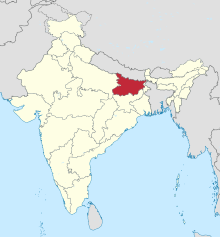Bihar

Bihar is an Indian state considered to be a part of Eastern as well as Northern India. It is the 13th-largest state of India, with an area of 94,163 sq. km (36,357 sq mi). The third-largest state of India by population, it is contiguous with Uttar Pradesh to its west, Nepal to the north, the northern part of West Bengal to the east, with Jharkhand to the south. The Bihar plain is split by the river Ganges which flows from west to east. Bihar is an amalgamation of three main distinct regions, these are Magadh, Mithila and Bhojpur. Its official languages are Hindi and Urdu. Its capital and largest city is Patna
Its current Governor is Rajendra Arlekar, its current Chief Minister is Nitish Kumar, and its State Legislature is currently controlled by the Bharatiya Janata Party-led National Democratic Alliance.
| This geography-related article is a stub. You can help out with Wikiquote by expanding it! |
Quotes
[edit]- A third important contributor [to the culture of India] was the Bihari culture. I once knew a girl of the Dutch Hindu community (from Surinam but ultimately from eastern UP and western Bihar) who was a bit shy about her family name Bihari, because she had heard that Bihar was the most backward part of Bharat. So we went through Bihari history together. It turned out to be extremely glorious. Not only did the first great empires originate there, Kapila was from there – the founder of one of the two defining philosophies of Hindu Dharma, viz. Sankhya-Yoga, and venerated as the philosopher par excellence in the Gita. The first Upanishadic seers, starting with Yajñavalkya, ultimately the originators of the other great philosophy, Vedanta, developed their ideas at king Janaka’s court in Videha, i.e. northwestern Bihar.
Also from Bihar was Mahavira, leading light of Jain Dharma (Jainism). Finally, from the Sankhya tradition sprang Bauddha Dharma (Buddhism), with Shakyamuni himself growing up in Kapilavastu, which had been built next to Kapila’s hermitage. To a large extent, all these visionaries perfected and systematized ideas that had already been present in the local Bihari culture, such as the idea of reincarnation and the practice of renunciation and meditation. Today Bihar is undergoing a bit of a dip, but it is the cradle of what has been called “the greatest achievements of the human mind”.- Dr. Elst, K. Interview, as quoted in 2019
- Like Burma/Myanmar, Bihar is a case of partial state failure that falls short of complete collapse. In Bihar the civil service is reasonably competent but elected governments have colluded in the privatization of violence. Bihar thus allows us to explore the impact of the erosion of the monopoly of violence alone, without the confounding effects of the host of issues simultaneously in play in cases of radical collapse like Afghanistan. People in Bihar must live with the effects of the privatization of violence, even while the central government mandates democratic political institutions and a civil service that is often corrupt but relatively competent at delivering services.
- Neil A. Englehart (8 May 2017). Sovereignty, State Failure and Human Rights: Petty Despots and Exemplary Villains. Taylor & Francis. p. 133. ISBN 978-1-315-40821-7.
- It is partly, no doubt, because of the furor islamicus that post-Gupta remains are surprisingly few in Bihar.
- J. C. Harle, The Art and Architecture of the Indian Subcontinent (London: Penguin, 1986), p. 199. in Ibn Warraq, Defending the West, ch 6.

